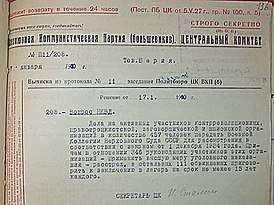Politburo
A politburo (/ˈpɒlɪtbjʊəroʊ/) or political bureau is the executive committee for communist parties.[1] It is present in most former and existing communist states. Under Trotskyism, the Politburo is a bureau of the Central Committee.
Names
The term "politburo" in English comes from the Russian Politbyuro (Политбюро), itself a contraction of Politicheskoye Byuro (Политическое бюро, "Political Bureau"). The Spanish term Politburó is directly loaned from Russian, as is the German Politbüro. Chinese uses a calque (Chinese: 政治局; pinyin: Zhèngzhìjú), from which the Vietnamese (Bộ Chính trị "部政治"), and Korean (정치국, 政治局 Jeongchiguk) terms derive.
History
The first politburo was created in Russia by the Bolshevik Party in 1917 to provide strong and continuous leadership during the Russian Revolution occurring during the same year.[2][3] The first Politburo had seven members: Lenin, Zinoviev, Kamenev, Trotsky, Stalin, Sokolnikov, and Bubnov.[4] During the 20th century, nations that had a politburo included the USSR, East Germany, Afghanistan, Czechoslovakia and China, among others. Today, there are five countries that have a politburo system: China, North Korea, Laos, Vietnam, and Cuba.[5]
Socialist/Marxist–Leninist states
In Marxist–Leninist states, the party is seen as the vanguard of the people and from that legitimizes itself to lead the state. Essentially, the party officials in the Politburo informally lead the state.
Officially, the Party Congress elects a Central Committee which, in turn, elects the Politburo and General Secretary in a process termed democratic centralism. The Politburo was theoretically answerable to the Central Committee.
Trotskyist parties
In Trotskyist parties, the Politburo is a bureau of the Central Committee tasked with making day-to-day political decisions, which must later be ratified by the Central Committee. It is appointed by the Central Committee from among its members. The post of General Secretary carries far less weight in this model. See, for example, the Lanka Sama Samaja Party.
See also
- Eastern Bloc politics
- Executive committee
- Orgburo
- Politburo of the Communist Party of the Soviet Union
- Politburo of the Communist Party of China
- Politburo of the Communist Party of Cuba
- Politburo of the Communist Party of Vietnam
- Politburo of the Communist Party of India (Marxist)
- Politburo of the Lao People's Revolutionary Party
- Politburo of the Party of Labour of Albania
- Politburo of the People's Democratic Party of Afghanistan
- Politburo of the Polish United Workers' Party
- Politburo of the Workers' Party of Korea
- Political Bureau of the Central Committee of FRELIMO
- Politburo of the Zimbabwe African National Union – Patriotic Front
- Presidium
References
- "Received 2012-02-02". Merriam-webster.com. 31 August 2012. Retrieved 16 June 2014.
- "USSR: Communist Party: Politburo". Archontology.org. Retrieved 16 June 2014.
- "Politburo (Soviet political body) – Encyclopædia Britannica". Britannica.com. 24 April 2013. Retrieved 16 June 2014.
- Dmitri Volkogonov, Lenin. A New Biography, translated and edited by Harold Shukman (New York: The Free Press, 1994), p. 185.
- "A List of Current Communist Countries". Geography.about.com. 29 May 2014. Retrieved 16 June 2014.
